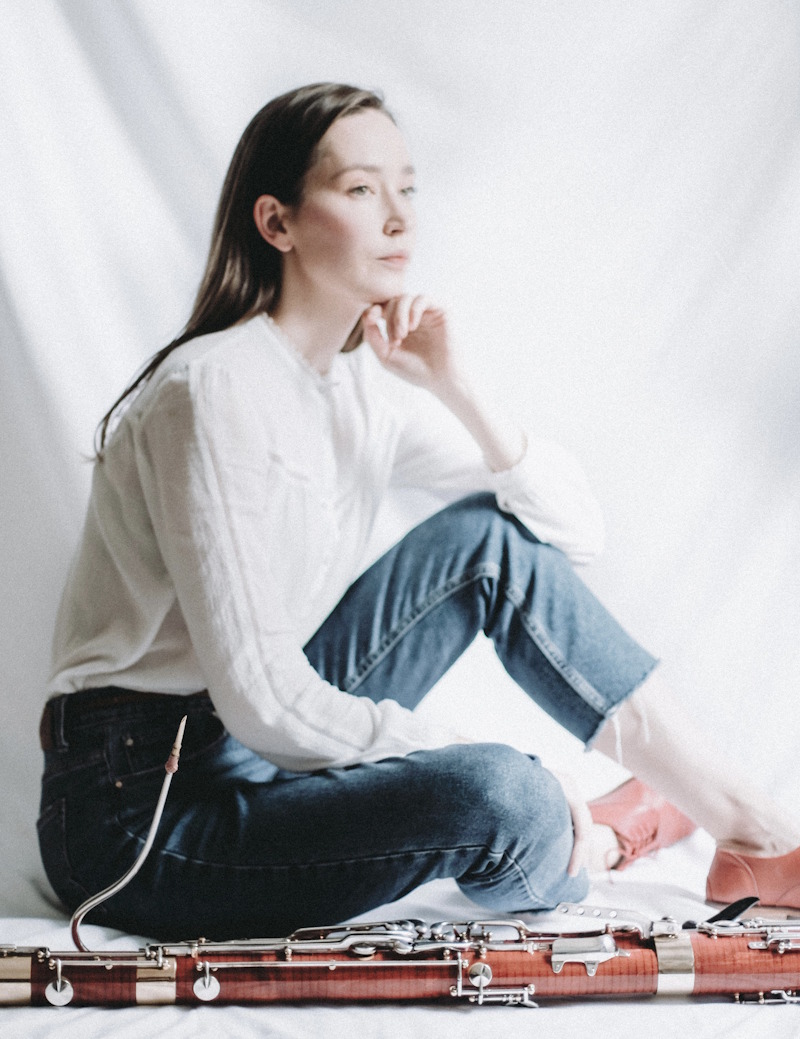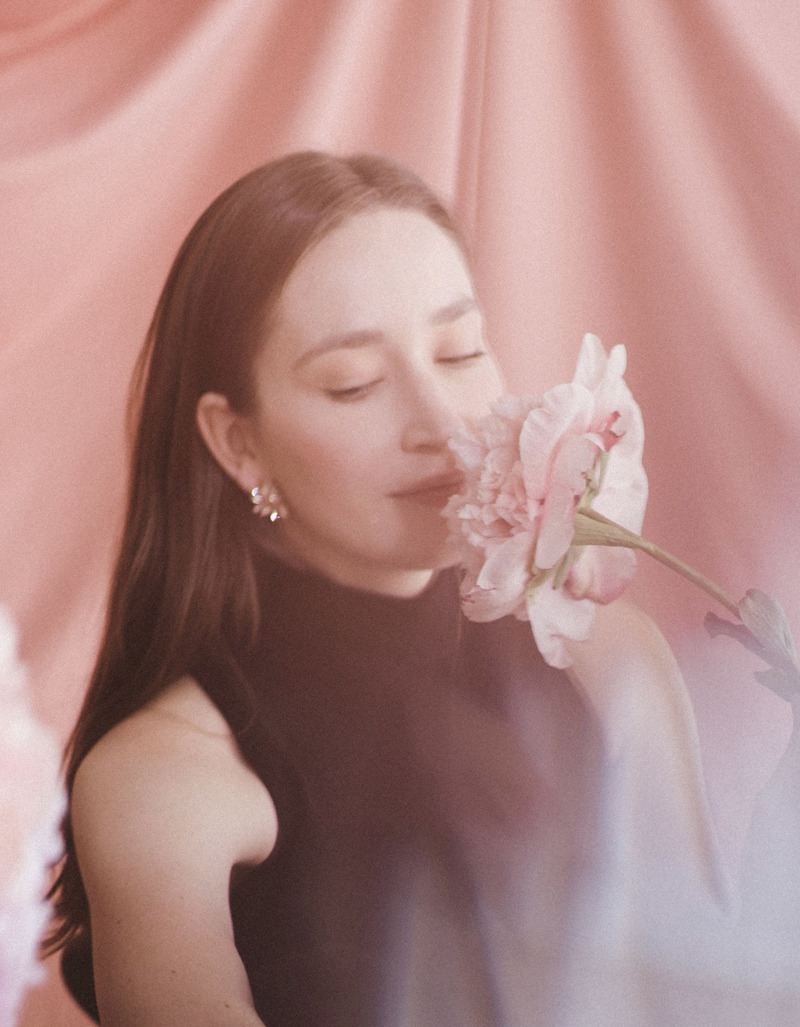MICHAELA ŠPAČKOVÁ
BIO
“..the soloist demonstrated an impressive richness of tone, singing through the bassoon that was truly spine-tingling.” Bad Homburger Woche

Michaela Špačková is a dynamic and visionary bassoonist whose artistry bridges the classical and new music worlds. At 17, she debuted as a soloist with the Prague Philharmonia, following appearances with with leading orchestras, including the ORF Wien, Munich Chamber Orchestra, and the Czech Philharmonic, earning over 20 awards at major competitions, including the ARD Music Competition and the Prague Spring Competition. She has performed on some of the world’s most renowned stages, such as the Berliner Philharmonie, Philharmonie de Paris, and recitals at Konzerthaus Berlin and Tokyo’s Suntory Hall, where she played with Radek Baborák.
Her work as a principal bassoonist has taken her to the Konzerthausorchester Berlin under Christoph Eschenbach and the Staatskapelle Berlin Academy under Daniel Barenboim. Michaela regularly collaborates with ensembles such as the Deutsche Kammerphilharmonie Bremen, HR-Sinfonieorchester, and Ensemble Resonanz, working with conductors like Sir Simon Rattle, Paavo Järvi, Zubin Mehta, and Jakub Hrůša.
Michaela’s artistic approach blends tradition with innovation, she is dedicated to new music, having premiered Matthieu Stefanelli’s Gaïa ou le Cri de la Terre, which was featured on ARTE at the Nouveaux Horizons festival with Renaud Capuçon. Her repertoire spans from classic bassoon concertos to collaborations with artists like Alli Neumann, exploring a variety of genres and styles. Michaela is also a dedicated educator and teaches at the Hochschule für Musik und Tanz Köln and leading masterclasses across Europe and Japan. She completed her musical education at the Hochschule für Musik Hanns Eisler Berlin with Prof. Volker Tessmann and at the Conservatoire National Supérieur de Musique et de Danse de Paris.
In the 2024/2025 season, Michaela will perform with the Konzerthausorchester Berlin and Bayerisches Kammerorchester, among others. She will record her debut album for Supraphon, featuring two newly commissioned works, and premiere a piece by Nikol Bóková for bassoon and string quartet in the fall. Michaela is also curating her new concert projects, Smyth & The Voice, She Found, which will be premiered at Kühlhaus Berlin.
PORTRAIT
The Born Bassoonist: Michaela Špačková
A Portrait by Tom R. Schulz

There are children for whom the angels of music seem to sing at their very cradles. For most others, talent and inclination toward music are options—paths that may unfold, or not, depending on life’s circumstances. But sometimes, there are children for whom music fights its way through like a stubborn flower breaking through concrete—against all resistance, indifferent even to sensitivities. This is how it was for the bassoonist Michaela Špačková (pronounced Shpatzkova).
“I was shocked by how intensely music struck me when I was 11 or 12,” she recalls. That awakening came during a concert at the Rudolfinum, the classical concert hall in her hometown of Prague. Her grandmother had recently started taking her there occasionally to hear music. As a little girl, Michaela had longed to play the violin and the piano, but at home, music education stretched no further than the recorder in school. No one in her family played music. Yet a teacher, sensing the musical spark in the young girl who spent her days painting, helped arrange for her to attend a music high school after primary school.
There, three instruments awaited her choice: the oboe, the horn, or the bassoon. “The bassoon looked cool, and the teacher was cool too—I’d seen him perform at the Rudolfinum,” Michaela says. And so, the bassoon it was. But why she should spend time with this strikingly beautiful instrument beyond her lessons was, at first, lost on her. “I never practiced, and after six months, the teacher threatened to throw me out,” she says. “That’s when I finally started practicing—and it was immediately so much fun.”
From here, the story might have unfolded smoothly. The child and the instrument, perfectly matched. Proud parents, growing talent, blossoming ambition. Competitions, school orchestras, youth ensembles. Perhaps a crisis or two, overcome with determination. A music degree, a position in an orchestra, and a steady career until retirement.
Michaela, too, knew by the age of 15 that nothing touched her more deeply than playing this mysterious, chestnut-brown, gleaming wooden tube with its three broad metal rings, countless keys, and swan-necked bocal. Yet her path was anything but smooth. “The bassoon became a sanctuary for me, a refuge where I could let my emotions run free,” she says. “It was also a place for healing.” Her music high school was excellent, but her home was less welcoming. Her mother met Michaela’s growing obsession with the bassoon—and her dream of becoming a musician—with misunderstanding, rejection, and resistance. “I partied a lot back then, but I also played a lot of music,” Michaela remembers.
In her early twenties, she left her hometown of Prague for Berlin with her boyfriend. Shortly after arriving, the relationship ended. Michaela stayed, alone in the sprawling city, and began studying
bassoon at the Hanns Eisler School of Music under Volker Tessmann. To make this work, she endured precarious living conditions. She had no instrument of her own; the rented bassoons she played were of middling quality at best. Doubts crept in—crises, uncertainty about her chosen path. “But I kept playing, no matter what,” she says.
A turning point came in 2018/19 when an Erasmus scholarship allowed her a semester in Paris. There, with her finances briefly stabilized, she practiced obsessively from dawn to dusk. She made almost no social connections but fell in love with the lyrical, light, and airy approach of the French bassoon school. Her playing grew—more polished, more personal.
Everything seemed to point toward an orchestra position, but during auditions, her nerves frayed, and her rented instruments often fell short—unable to produce the volume or tone required, no matter how refined her technique. Without her unshakable connection to the bassoon and her sanctuary in classical music, Michaela might have abandoned this unwieldy instrument with its nasal timbre. Yet the bassoon is also an instrument of profound character—taking the lead in iconic works like Paul Dukas’ *The Sorcerer’s Apprentice* or Igor Stravinsky’s *The Rite of Spring.*
Today, when Michaela Špačková stands in one of her elegant, flowing concert gowns, performing before an orchestra or with an ensemble, she and her bassoon appear as one—a symbiotic union. Two tall, slender figures: one of wood, the other of flesh and blood. Is there such a thing as a born bassoonist?
During the pandemic, Michaela worked music-adjacent jobs to survive while keeping her technique sharp and her body ready. Gradually, a vision crystallized: of how to express herself fully through the bassoon, not just now, but in all the years ahead. “I hear a sound that doesn’t exist yet,” she says—a bold statement, but one that captures her drive to stand on stage as a soloist, coaxing passion and sonic variety from the bassoon for herself, for music, and for her audience.
Though she improvises and performs with the acclaimed pop singer Alli Neumann, Michaela’s heart remains firmly anchored in classical music.
In March 2025, she plans to take her concert exam, accompanied by the Konzerthausorchester Berlin. One of the featured pieces will be John Williams’ *The Five Sacred Trees,* an original composition for bassoon and orchestra. When asked which contemporary composers she admires and dreams of performing, Michaela lights up, listing names with rapid enthusiasm: Jörg Widmann, Lera Auerbach, Andrej Adamek, Gabriela Smith, Anders Hillborg, Caroline Shaw.
Two years ago, she premiered Matthieu Stefanelli’s *Gaïa ou le Cri de la Terre* for bassoon, string sextet, and piano at the Nouveaux Horizons festival in Aix-en-Provence. The ARTE-recorded performance is available on YouTube. The piece celebrates expressiveness, traversing the full tonal range of the bassoon. It is also a poignant call not to ignore Gaia’s perilously silent cry—the Earth Mother’s plea amid the destruction we continue to cause. Michaela feels this piece deeply; its message fits her as if it were written for her.
“The bassoon is my voice, my body,” she says—a statement that reverberates. Berlin often feels too vast, too loud, too crowded for Michaela, who is deeply connected to nature. She longs for the scent of the forest, the wood, the trees, the silence. When she plays, she commands the bassoon like an energetic forest spirit, taming this glossy, obstinate piece of wood with her breath, coaxing it into bloom with extraordinary intensity. And with it, she awakens all the forests and
every living soul on Earth.